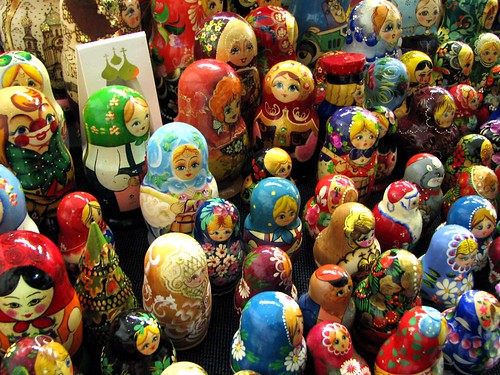Credit photo: Caro Willis via Flickr
Precision questioning: the joy of parenthood.
As you may know, I am the lucky dad of a 3-year old boy. At that age, after the so-called Terrible 2's, it is supposed to be a delight to raise a child: as he is old enough to interact and understand, but still sufficiently young to avoid demonstrating rebellious attitudes. On paper, the ideal. but what this paper's small prints hide from you is that there is still some maintenance to that presumably well-oiled machine. And the keyword is "why?".
Kids want to make sense of their surroundings, of the words, of the people, of philosophical topics and astronomical phenomenons, of the weather, of the behaviour and social conventions... Each of these items is like an endless Russian doll: you start by answering a first seemingly easy question, and it triggers another one, that will raise another one, and another one... After the twentieth interrogations your rational adult brain is no longer able to get the thread of thoughts that led you to answer "why clouds are white?" whilst the conversation started on "what was a can opener?"!
Along the process, you try your best to provide answers that make sense, and keep you on the glorious altar your child puts you on. You are the source of truth. You are a well of wisdom. You are the equal to Aesop, Plato, Homer, Nietzsche, Kant... At least in their eyes, and you certainly don't want to contradict them (it feels so good). But frankly, sometimes their questioning skills are such that you reach the end of your knowledge, and most likely the end of your patience. And suddenly the answer gets less elaborate: "why is the..." he says, "because it's like that!" you interrupt.
Educational non-sense.
If children ask a ton of questions, my personal burden tallies to two tons... That is the curse of raising a bi-cultural kid. Two cultures, two languages, twice the fun. You not only need to handle the Why's but also the Pourquoi's. He clearly dissociates both cultures, so he naturally wants to make sense of twice more things but, to paraphrase Dr. Zeus' Oh, The Places You'll Go!
Let's take the example of this famous nursery rhyme:
Hey diddle diddle,You have to reckon that such a infantine text, beyond the rhetorical rhymes is a gold mine for questioning children. How can a cow jump over the moon? Why is the dish running? Why our do plates do not run? Why a fiddle? Why? Why? WHYYYYY?
The Cat and the fiddle,
The Cow jumped over the moon,
The little Dog laughed to see such fun,
And the Dish ran away with the Spoon
As a French, I have been educated with La Fontaine's fables and have learned that there is often a moral to what seems to be a light hearted text. So I looked hard at the text trying to find some sense myself from these lines. And since I could not, I started to check between the lines.
A long time ago, Bruno Bettelheim's The Uses of Enchantment: The Meaning and Importance of Fairy Tales
To regain my pride, I looked at other cultural references and even cryptology. To no avail. Were these lines an acrostic, like The Beatles' Lucy in the Sky with Diamond song? No luck. In the end, I resolved myself to conclude that it may just be one of the famous British non-sense. That was not totally fulfilling an outcome, but quite handy. I could indeed blame my host culture for teaching non-sense to generations of future Eton graduates. Because of course on the other side of the Channel, obviously, we are way better. Aren't we?
Absurdity united
My mind is filled with French songs gathered during my own childhood, but frankly my Why-years are so far behind that I have not questioned or even listed to their lyrics for a very long time. But doing so, it revealed that absurdity was a shared value in nursery times:
Not only is the child almost bullied by his mother, but seriously what does that song mean? Why would a mother assert that boats are legged? Why? Why? I was suddenly regressing to my 3rd year on Earth. And my convictions collapsed.
Maman, les petits bateaux
French lyrics English translation Maman, les petits bateaux Mum, do small boats Ont-ils des jambes? Have legs? Mais oui mon gros beta Of course, you silly, S'ils n'en avaient pas, If they hadn't, Ils ne marcheraient pas! They couldn't walk!
If our childhood is nothing but nonsense, how are we supposed to build our psyche? Maybe our children are right in questioning us... After all, the French idiom says that the "truth comes out of children's mouth". So from now on, I give my little one an even greater attention when he turns back to me with his interrogations. I am more patient with the real Plato of the household.


No comments:
Post a Comment